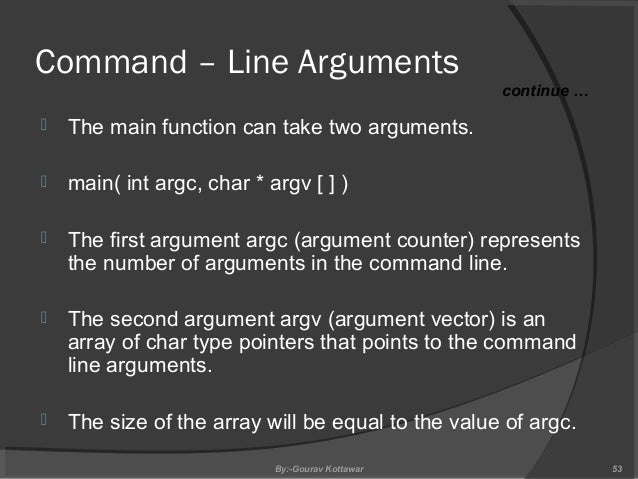I have not been able to find any documentation on how to process the command line arguments of a C/WinRT, XAML app. In Visual Studio 15.9.6 the application properties do provide a way to enter command line arguments during the development effort, but no way to process them. Command line arguments are optional string arguments that are passed by the operating system to the program when it is launched. The program can then use them as input (or ignore them).
I'm trying to pass arguments to my program so that I can store them into an array. For some reason my IDE/compiler is treating the blank space in between arguments as an argument. I'm using bloodshed, but it doesn't say anything about a seperation character. Can anyone tell me what I'm doing wrong?
I'm doing something like this:
Bob Bill
that should be two parameters, but for some reason it returns three.
Command Line Argument in C. Command line argument is a parameter supplied to the program when it is invoked. Command line argument is an important concept in C programming. It is mostly used when you need to control your program from outside. Command line arguments are passed to the main method. Syntax: int main(int argc, char.argv). Command line arguments in C/C C C Server Side Programming Programming It is possible to pass some values from the command line to your C programs when they are executed. Argtable is an ANSI C library for parsing GNU style command line options with a minimum of fuss. It enables a program's command line syntax to be defined in. Aug 07, 2009 Command-line parameters are passed to a program at runt-time by the operating system when the program is requested by another program, such as a command interpreter ('shell') like cmd.exe on Windows or bash on Linux and OS X. The user types a command and the shell calls the operating system to run the program.
- 3 Contributors
- forum 2 Replies
- 911 Views
- 6 Hours Discussion Span
- commentLatest Postby Ancient DragonLatest Post

Dante Shamest
It appears to work for me. The version of my Dev-C++ IDE is 4.9.9.2. One should note that the first parameter is always the name of your program.
This is the program I used for testing.
This picture shows how I passed the parameters.
[IMG]http://img438.imageshack.us/img438/724/parameters1fz.th.jpg[/IMG]
And this is my output.